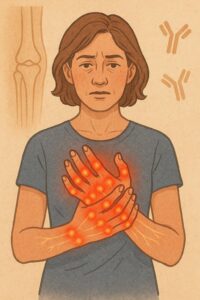Rheumatoid arthritis is a chronic autoimmune disease where the immune system attacks the joints, causing pain, swelling, stiffness, and over time, permanent joint damage. Unlike wear-and-tear arthritis (like osteoarthritis), RA is caused by inflammation that can also affect other parts of the body, including the eyes, lungs, heart, and blood vessels.
RA tends to affect smaller joints first (like fingers and toes), and it usually impacts both sides of the body (symmetrically).

